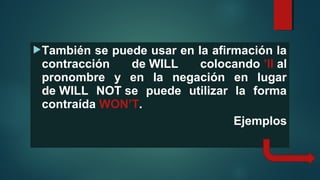Material didactico futuro will
- 1. Comunicaci├│n Productiva en Ingl├®s.Comunicaci├│n Productiva en Ingl├®s.
- 3. USO DEL FUTURO SIMPLE ’üĄ El Futuro Simple es un tiempo verbal que se utiliza para describir acciones que se van a desarrollar en el futuro sin necesidad de aclarar en que momento se producir├Īn. Su equivalente en el idioma espa├▒ol es el Futuro Imperfecto.
- 4. I CANŌĆÖT CARRY TH─░S LUGGAGE I WILL HELP YOU.
- 5. I am so sleepy and tired. I will get you some coffee..
- 6. ’üĄTambi├®n se puede expresar el tiempo en el que se desarrollar├Ī la acci├│n, por ejemplo: People will use more hybrid cars in 2020.
- 7. Affirmative:Affirmative: Subject + will + main verb I will dance He will dance They will dance
- 8. Negative: Negative: Subject + will + not + main verb I will not dance He will not dance They will not dance
- 9. Questions:Questions: Will + Subject + main verb Will you dance? Will she dance? Will they dance? Yes I will. No, I will not.
- 10. ’üĄTambi├®n se puede usar en la afirmaci├│n la contracci├│n de WILL colocando ŌĆÖll al pronombre y en la negaci├│n en lugar de WILL NOT se puede utilizar la forma contra├Łda WONŌĆÖT. Ejemplos
- 11. What would you like to drink, madam? IŌĆÖll have some orange juice, please.
- 12. ItŌĆÖs my secretŌĆ” I wonŌĆÖt tell your secret to anyone. I PROMISE.
- 13. Give me your money or IŌĆÖll kill you.
- 15. ’üČ se puede usar will/wonŌĆÖt con estas expresiones: ’ā╝ I thinkI think ’ā╝ I believeI believe ’ā╝ I hopeI hope ’ā╝ I am sureI am sure ’ā╝ ProbablyProbably ’ā╝ MaybeMaybe ’ā╝ PerhapsPerhaps
- 16. - IŌĆÖm sure theyŌĆÖll help me. - HeŌĆÖll probably pass his class. - Perhaps sheŌĆÖll talk to me. - I think It will be sunny tomorrow. - She believes she will win the lottery.
- 17. Exercise: IS THE FUTURE AS SUCH? INSTRUCTIONS: ŌĆóRead the following text. ŌĆóCopy the ideas that are in future ŌĆóParaphrase with your own words the idea of the sentence
- 18. Ghosts of the Future by Loren Cobb The news these days is filled with intimations of catastrophe. Will the approaching decline in worldwide petroleum reserves cause wars and famine? Have we caused global warming, and if so, will we suffer unimaginable climate change? These are just two of the ghosts that haunt our misty visions of the future. Earlier generations had their own ghosts. Most of us can well remember the fear of nuclear holocaust, and I have often thought about that dark period from about 1940 to 1942, when it must have seemed to any rational observer that all of civilization was about to destroy itself. Looking into the deep future, astrophysicists predict that our sun will someday turn into a red giant not unlike Betelgeuse, the huge red star on Orion's left shoulder. When this happens its diameter will rapidly expand out beyond the orbit of the Earth, utterly incinerating our entire planet. Fortunately this disaster lies some five billion years in the future, so few people stay up at night worrying about it. How can we weigh all of the factors describing an anticipated future disaster, to determine what is worth worrying about? How do we balance the size of a potential disaster against its depth in the future and the certainty of our knowledge? These are questions we can answer, concluding with a troubling example: the potential disruption of the oceanic currents due to global warming. Taken from: http://tqe.quaker.org/2006/TQE146-EN-Ghosts.html, for educative purposes

















